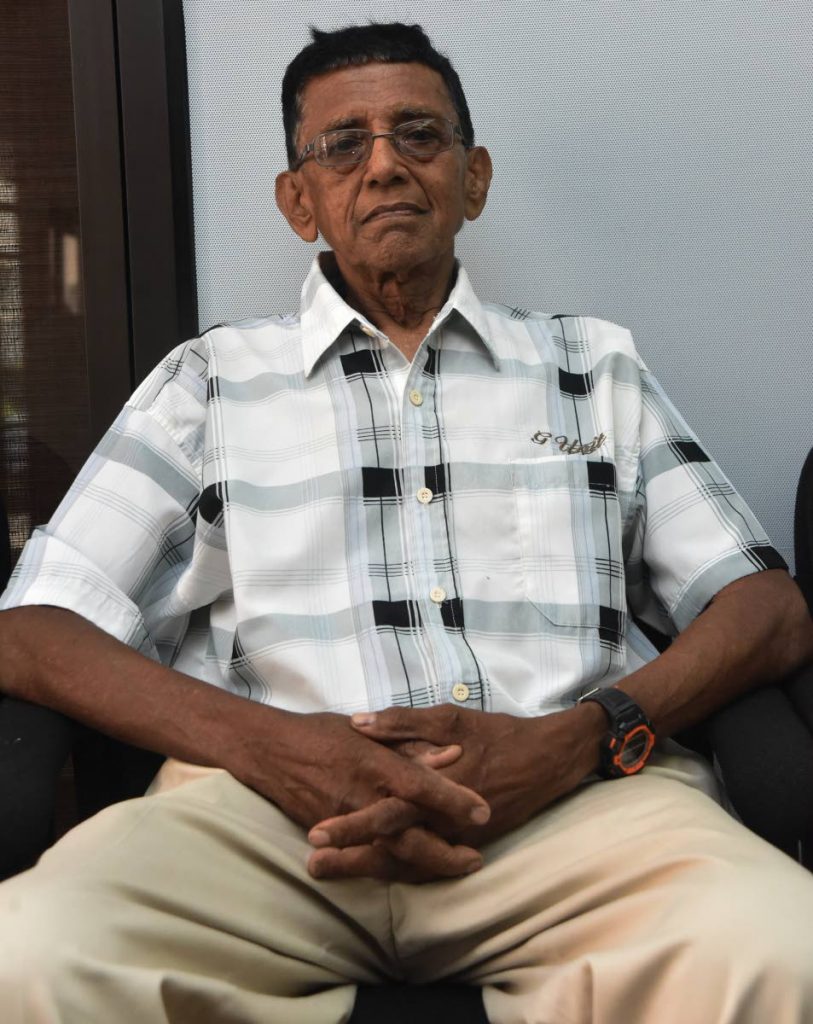Children must be able to choose how they learn

WHILE it is mandatory for children to go to school, the system does not teach students the benefits of learning a skill in any trade industry, says former cocoa farmer Faiz Khan.
After a two-hour drive from Canque Village, Biche, 80-year-old Khan visited Newsday’s head office, Pembroke Street, Port of Spain, last week, to highlight issues he said he has noticed taking place in the education system and to share his success story as a farmer.
He said there were challenges in the education system which needed to be fixed, because they were affecting the younger generation today.
Khan told Newsday he believes children should be given a choice to either go to school or learn a trade. This way, he said they can better contribute to TT’s economy, rather than turning to a life of crime if they find themselves struggling in the system.
“In my time I was given a choice. I chose to be a farmer. I have been very successful at what I did in my younger years,” Khan said.He added, “If children are given a choice they can go into different fields of trade, especially doing what they are interested in.
“They will be more focussed and willing to learn.” He added that “it made no sense for parents with low income jobs to spend money on book, uniforms, shoes, food and transportation to send a child to school and they have nothing to show after several years of studying. In those same years, a child could learn a trade, master it, while learning to read and write.”
Khan said after 62 years in the cocoa/coffee production and food crops industry, he had accomplished a lot.
He said the love for his trade led to him receiving an award in farming for nine consecutive years.
Khan was also the first farmer to be recognised for introducing and demonstrating to farmers how hand pollination is done in cocoa and to increase production in the sleeving of bananas.
He has also been a contributor to a magazine by the Professional Agriculture Scientists TT, in 2003, on revitalisation of cocoa production in TT.
One of his most memorable achievements was a visit he had from a manager of the makers of an internationally-known chocolate maker, Hershey’s Chocolate Company, based in Hershey, Pennsylvania, in the United States, for advice on cocoa production.
Although the local cocoa industry has all but collapsed, Khan said the industry was challenged by the lack of a labour force.
He said most cocoa farmers are too old to continue, and he was not convinced this generation was interested in the cocoa industry.
Khan said the cocoa industry was something someone had to have either grown-up in or have a passion for the hard work needed to make it a success.
He believes because children now are not given a choice between academics and learning a trade, it deprives the country of the much needed manpower, particularly in the agriculture sector.
“I am from 14 children and I was given a choice. I succeeded, despite the fact I did not go to school. Long ago, cocoa labourers produced 75 million pounds of cocoa per year and to date this country cannot produce one million pound.
“The Ministry of Education needs to engage students more in the training of practical skill sets, especially in agriculture,” he advised.
“I never went to a university but a university contacted me to give a lecture,” he said.
Khan said agriculture was not not just about toiling in the sun, but also involved the art of tilling the soil to produce food.
Focusing again on the cocoa industry, Khan said apart from the absence of young people in cocoa farming, one of the major problems in the sector was that subsidies, aimed at revitalising the industry, was not reaching farmers.
“This is the reason why we do not have young farmers today. There is no more hope to encourage young farmers to get involved in the cocoa industry.
“To me, the education system has taken away those who loved farming because they are being pressured to go to school. These days children do not have a choice, they must go to school. Some children are left behind because they cannot cope with school work.”
Khan said there was a need to get children involved in the things they like doing to keep them away from a life of crime.
He said once a child shows no interest in school, they should immediately be given a choice to do a desired trade.
“Long ago, you had a family of six children and one child might have gotten the chance to go to school while the others stay on the land to become farmers.
“While I am not against the education system, give the children a choice. With a choice they can become great farmers or a trade person in their communities. They can be better individuals rather than being a drop-out who lost interest in school.”


Comments
"Children must be able to choose how they learn"